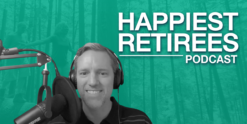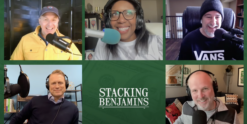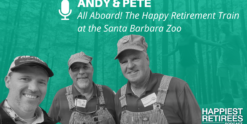What’s the most important aspect of retirement planning? Building a nest egg?
Good answer. However, based on my experience with countless retirees — both happy and unhappy — I think money is actually the second most important aspect of building a great retirement. No. 1 is knowing what you want to do with that money and the free time that comes with calling it a career.
Based on my extensive research into what makes for a satisfying retirement, the happiest retirees have several “core pursuits” — hobbies or activities that they are passionate about and engage in on a regular basis. To be precise, the happiest retired folks have an average of 3.6 core pursuits. Self-identified unhappy retirees reported having just 1.9 such activities.
Core pursuits run the gamut of human activity and are unique to each of us. Tennis, beekeeping, tutoring, choir, travel, model plane building, golf, sailing, substitute teaching, running, getting a college degree in medieval literature — that’s not even the tip of the tip of the core pursuits iceberg.
Following your passions in retirement provides numerous benefits. First and foremost, these activities can replace the structure and purpose previously supplied by our jobs. Sure, it’s great to sleep in and just hang around the house for a while after you turn in your office key. But eventually, you will want and need an organizing purpose for your days and life. (Your spouse may well want the same thing for you!)
Physical activities (golf, biking, gardening) can help keep our bodies in shape while mental pursuits, especially learning new things, keep our minds sharp.
Core pursuits that involve others (group exercise, church, volunteerism) provide the social connections and human interactions that are scientifically proven to support our mental and physical health. Research shows that people who allow themselves to become socially isolated are at higher risk of depression and various physical ailments. Interestingly, this is true, regardless of age.
So, what are you passionate about? If you’re not sure, you are not alone. In my experience, many people are so focused on career and family that they don’t make time to pursue existing passions or explore new ones. (How long has that racquetball racket been hanging in the closet?)
One upside of the COVID lockdowns from this past spring was that it allowed otherwise busy people to reconnect with old passions and explore new interests. My survey of 300 Americans aged 55-plus found that folks were using their COVID-induced downtime on such self-improvement activities as learning a musical instrument, picking up a new language, trying out painting or drawing, or taking an online class. A quarter of those surveyed said they plan to maintain their lockdown lifestyle even after the all-clear sounds. Some participants who are still working said they viewed some of the downtime in 2020 as an opportunity to “test-drive” retirement. For the folks that have enjoyed the ride, they’re now considering retiring early.
If you still haven’t identified your core pursuits, I have a new tool that might help. My Core Pursuit Finder, which you can find under the Tools tab on my website, suggests possible areas of interest based on your answers to several questions about your attitudes and current lifestyle. Among the queries: How active are you today, and how would you like to give back to the community?
At the very least, the results of the Core Pursuit Finder survey will get you thinking and, hopefully, doing. The “doing” part is critical. The only way to fill your core pursuits dance card is to get out there and introduce yourself to new things.
Not long ago, I asked my colleagues to give me a list of their clients’ core pursuits. Most of these fell into one of four categories. There was part-time work, like teaching, consulting and decorating. Then there was exercise and health — hiking, biking, swimming and walking. The arts were a big one, too, with cooking, painting and music creating a chunk of the list. And then there was adventure, such as travel, cruising, RVing, piloting and sailing.
There were 100 core pursuits on our list. What activities will you add to that list in retirement?
The only way to know is to set aside the time, energy and perhaps, a bit of money to see what catches your fancy. Join a bird-watching meetup group. Want to be a spy novelist? Set aside time to attend a creative writing seminar. Take a martial arts class. Volunteer at a soup kitchen once a week. Eventually, something will click.
Here’s one final benefit of identifying your retirement core pursuits: It makes the rest of your retirement planning easier, including the financial piece. Until you know how you are going to spend your post-career days, it’s difficult to know how much money you need to fund your vision of retirement. A retirement spent traveling the world carries a heftier price tag than one centered around community service, golf and reading.
So, go and do the fun part first! Follow your bliss. Once you find it, then we can worry about the money.
Wes Moss has been the host of “Money Matters” on News 95.5 and AM 750 WSB in Atlanta for more than 10 years now, and he does a live show from 9-11 a.m. Sundays. He is the chief investment strategist for Atlanta-based Capital Investment Advisors. For more information, go to wesmoss.com.
Read the AJC article here.
Disclosure: This information is provided to you as a resource for informational purposes only. It is being presented without consideration of the investment objectives, risk tolerance or financial circumstances of any specific investor and might not be suitable for all investors. Past performance is not indicative of future results. Investing involves risk including the possible loss of principal. This information is not intended to, and should not, form a primary basis for any investment decision that you may make. The information contained in this piece is not considered investment advice or recommendation or an endorsement of any particular security. Further, the mention of any specific security is solely provided as an example for informational purposes only and should not be construed as a recommendation to buy or sell. Always consult your own legal, tax or investment advisor before making any investment/tax/estate/financial planning considerations or decisions.













